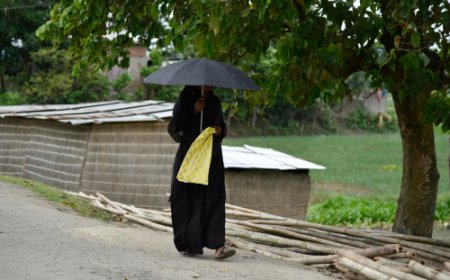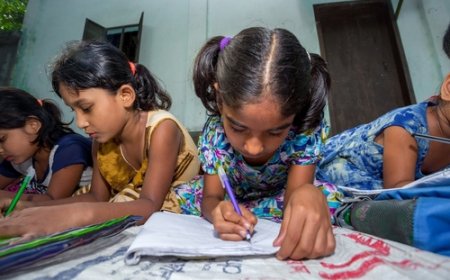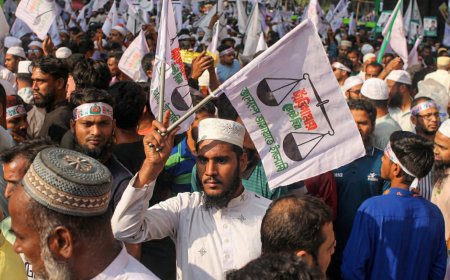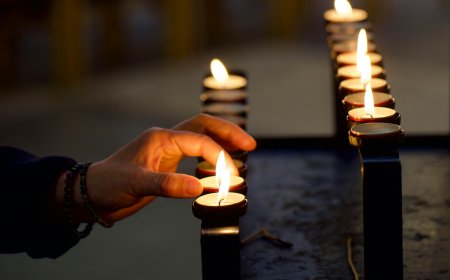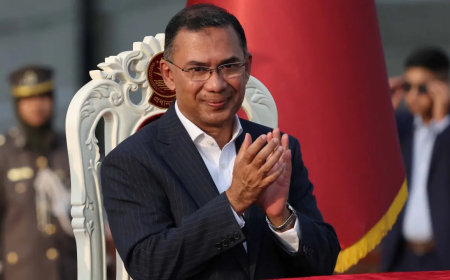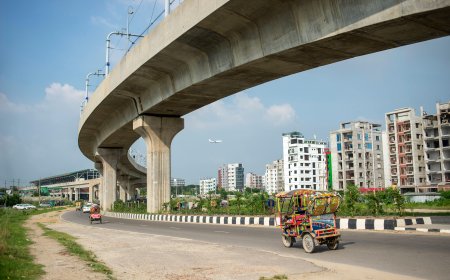Want Justice? End the Death Penalty.
Ending the death penalty and ensuring fair trials would not weaken the pursuit of accountability -- it would strengthen it. In doing so, Bangladesh’s long-awaited reckoning with the past could become the foundation of a more just, rights-respecting, and humane future.

“The highest punishment under the International Crimes [Tribunals] Act is death -- Hasina deserves the highest punishment,” said Chief Prosecutor Tajul Islam before the International Crimes Tribunal (ICT), Bangladesh’s domestic court established originally in 1973 following Bangladesh’s bloody Liberation War, and revived in 2010 by Sheikh Hasina’s government to try crimes against humanity and other serious violations of international law. He made the statement this month while concluding his five-day argument in the case against former Prime Minister Sheikh Hasina.
The irony of the new Bangladesh’s government using the ICT to pursue justice against Sheikh Hassina is not lost on most Bangladeshis: Sheikh Hasina herself revived the ICT when she came to power to eliminate her political opponents through unfair show trials that resulted in the death penalty of prominent opposition politicians.
On November 6, 2025, the Advisory Council of the interim government granted final approval to the draft Enforced Disappearance Prevention and Redress Ordinance 2025, which prescribes the death penalty as the maximum punishment for cases of enforced disappearance. Meanwhile, the ICT is investigating enforced disappearance as a crime against humanity committed under Sheikh Hasina’s rule.
This development followed a watershed moment in Bangladesh’s pursuit of justice. On October 11, 2025, the Army Headquarters announced the arrest of fifteen army officers after the ICT issued warrants for their detention. Just days earlier, on October 8, Bangladeshi authorities had taken an unprecedented step toward accountability by charging several high-ranking officials -- including Sheikh Hasina -- with enforced disappearances, secret detention, and torture.
Since the revolution last year that ousted Sheikh Hasina, the interim government has signed the International Convention for the Protection of All Persons from Enforced Disappearance and established a Commission of Inquiry on Enforced Disappearances to investigate hundreds of unresolved cases, showing a commitment to addressing the wrongs of the past.
Despite these positive developments, in the year since Sheikh Hasina fled to India, the interim government has failed to take concrete steps toward abolishing the death penalty -- a vestige of authoritarian rule that remains fundamentally incompatible with modern standards of justice.
The continued use of the death penalty in Bangladesh is not merely a policy choice; it is a colonial inheritance rooted in British imperial law, one that has long outlived its moral and legal legitimacy. Bangladesh’s experience highlights the dangers of retaining the death penalty in a system still vulnerable to political influence.
During the ICT trials for war crimes committed during the Liberation War, at least six executions were carried out, including that of Abdul Quader Molla, a senior Jamaat-e-Islami leader convicted of war crimes in 2013. His trial and those of others were condemned by international observers, including United Nations human rights experts, for procedural irregularities, political interference, the intimidation and even abduction and disappearances of witnesses, and retroactive legal changes. Such cases demonstrate how capital punishment, once imposed, closes the door to remedy or redress.
In another case, Mir Ahmad Bin Quasem, also known as Arman, a Bangladeshi lawyer and human rights activist, was forcibly disappeared for eight years -- from 2016 to 2024. He was abducted shortly after his father, Mir Quasem Ali, a prominent Jamaat-e-Islami leader, was sentenced to death and later executed by the Hasina government on September 6, 2016. Arman told Fortify Rights that he believes his father’s trial was politically motivated.
Instead, Bangladesh should follow the example of other South Asian nations, such as Nepal and Bhutan, both of which have abolished capital punishment.
The Enforced Disappearance Prevention and Redress Ordinance is a strong law. It includes the creation of a compensation fund for victims of enforced disappearance and their families. Fortify Rights advocated for a robust reparations program, and this represents a crucial step toward making that vision a reality, for the families, victims, and those still missing.
However, the interim government must now take bold, principled steps to align Bangladesh’s legal framework with international human rights norms -- and this requires amending both the ICT Act and the Enforced Disappearance Ordinance to explicitly exclude the death penalty as a sentencing option. True justice cannot be achieved through state killing and the flawed trials which characterized the ICT proceedings under Sheikh Hassina.
The proceedings before the ICT are expected to be conducted in absentia, as Sheikh Hasina is unlikely to be extradited from India. Consequently, while the accused may receive a death sentence, it is unlikely ever to be implemented. But that is beside the point.
True justice cannot coexist with the death penalty, nor with a denial of fair trial rights. Before proceeding with these trials, the government should abolish capital punishment entirely by amending the ICT Act and all related legislation, and to make sure that robust fair trial measures are implemented to prevent the unfair show trials from repeating themselves. Flawed justice is injustice. Such reforms would send a clear and principled message: Bangladesh is committed to justice over retribution and firmly rejects state-sanctioned violence in all its forms.
Ending the death penalty and ensuring fair trials would not weaken the pursuit of accountability -- it would strengthen it. In doing so, Bangladesh’s long-awaited reckoning with the past could become the foundation of a more just, rights-respecting, and humane future.
John Quinley is a director at Fortify Rights and Peter Bouckaert is a senior Director at Fortify Rights.
What's Your Reaction?













